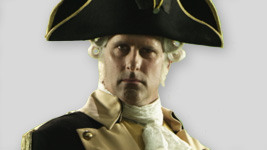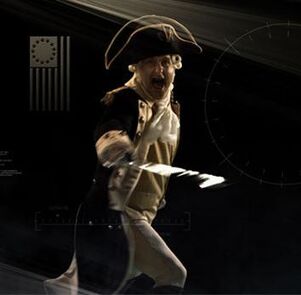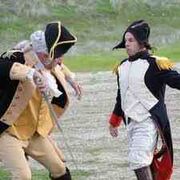| George Washington | |
|---|---|

| |
| Weapons | Colichemarde Sword, Brown Bess Flintlock Musket & Pennsylvania Long Rifle, 6 Pound Cannon |
| Origin | Eastern United States |
| Activities | Defeating the British 1st US President |
| Service | 1775-1783 (American Revolution) 1789-1797 (US President) |
| Battle Status | Won vs. Napoleon Bonaparte |
| Experts | Paul Suda (18th Century Weapons Expert)
|
"To be prepared for war is one of the most effectual ways of preserving peace." -George Washington
"Washington had a very clear goal in mind. He set himself to accomplish that goal with the resources he had on hand, and he came in with less than he wanted, and ended up winning the war." - Paul Suda, 18th Century Weapons Expert
George Washington, the American hero who, against all odds, defeated the mighty British Army;
Napoleon Bonaparte, the bloodthirsty French Emperor whose maniacal dream was to conquer the world.
Stats
- Circa - 1781
- Age - 49
- Height - 6' 3"
- Weight - 200 lbs
Symbole - Colonial America Flag (with 13 stars)
History

George Washington was born on February 22, 1732 in Colonial Virginia. Strong, brave, eager for combat, and a natural leader, he quickly became a senior officer in the British Army during the early years of the French and Indian War. Years later, Washington's experience, military bearing, and leadership skills made him an obvious choice for Commander-in-Chief of the Continental Army during the American Revolution, recommended by his future-vice-president and presidential successor John Adams.
Washington forced the British out of Boston in 1776, but was defeated and nearly captured later that year when the British captured New York City. Early on Christmas morning in 1776, Washington's forces crossed the Delaware River and won two key battles at Trenton and Princeton, retaking New Jersey and restoring momentum to the Patriot cause. Negotiating with Congress, governors, and French allies, he held together a tenuous army and a fragile nation amid the threats of disintegration and invasion. Washington delivered the final blow in 1781, after a French naval victory allowed American and French forces to trap a British army at Yorktown, Virginia. With the surrender of British Lieutenant General Lord Cornwalis, the British goverment was finally prompted to negotiate an end to the conflict. After American indepenence was secured by the Treaty of Paris in 1783, Washington resigned rather than seize power, and returned to his plantation at Mount Vernon, proving his opposition to dictatorship and his commitment to the emerging American political ideology of republicanism.
Washington presided over the Constitutional Convention that drafted the United States Constitution in 1787, and was unanimously elected the first President of the United States by the Electoral College in 1789. Aware that everything he did set a precedent for future Presidents to follow, Washington reluctantly accepted a salary (so that the office of President would not be limited only to the wealthy), chose the title "Mr. President" over more majestic names, and retired after his second term. In December 1799, Washington fell ill after spending several hours inspecting his farms on horseback in snow and freezing rain. He would die several days later on December 14, 1799.
Weapons
| Short Range | Colichemarde Sword |
| Medium Range | Brown Bess Musket and Pennsylvania Long Rifle |
| Long Range | 6-Pound Cannon |
| Tactics | Hybrid Warfare |
Simulated Battle
The battle starts with Napoleon and 4 Grand Armée soldiers coming over a hill looking above General Washington's militia. Napoleon's lieutenant hands him a telescope so that he can get a better view on their situation. Below, Washington looks up at Napoleon's small regiment just as he gives the signal for his soldiers to advance. Washington commands his men to arm up their Brown Bess Muskets and begin firing as Napoleon's lieutenant gives the order to open fire with their Charleville muskets, killing one militia man.![]() The milita men return fire with their Brown Bess muskets, also killing a French soldier.
The milita men return fire with their Brown Bess muskets, also killing a French soldier. ![]() Washington then orders the militia sniper to take out Napoleon's lieutenant, shooting him off of his horse with the Pennsylvania Long Rifle.
Washington then orders the militia sniper to take out Napoleon's lieutenant, shooting him off of his horse with the Pennsylvania Long Rifle.![]()
Both leaders then give the order to prepare their cannons. Napoleon's 8 pounder is the first to fire, shooting and killing an American revolutionary as the ball blasts clean through his mid-section.![]() Washington then fires off his 6 pounder, decapitating a Grand Armée soldier.
Washington then fires off his 6 pounder, decapitating a Grand Armée soldier.![]() Washington commands the cannon to be reloaded, but quickly orders his men to get down as Napoleon's men fire off another shot which cripples the cannon. Washington then gives the order to charge as he makes for his horse. Back up on the hillside, the Napoleonic cannoneer loads grapeshot into the cannon as Washington's remaining two men charge up the hill, muskets in hand. The cannoneer hurriedly slams the grapeshot into the back of the cannon as the fuse quickly burns into the cannon and dives for cover as the grapeshot rips down the hill, killing one militia man and wounding the other.
Washington commands the cannon to be reloaded, but quickly orders his men to get down as Napoleon's men fire off another shot which cripples the cannon. Washington then gives the order to charge as he makes for his horse. Back up on the hillside, the Napoleonic cannoneer loads grapeshot into the cannon as Washington's remaining two men charge up the hill, muskets in hand. The cannoneer hurriedly slams the grapeshot into the back of the cannon as the fuse quickly burns into the cannon and dives for cover as the grapeshot rips down the hill, killing one militia man and wounding the other.![]()
Napoleon then mounts up on his horse as Washington rides past his fellow man, who is struggling to get to his feet. Washington rides up to the remaining cannoneer, who tries to retrieve his sword, and strikes him across the neck with his Colichemarde sword, killing him instantly.![]() Bonaparte does the same to the wounded militia man, riding past him and slicing him with his cavalry saber.
Bonaparte does the same to the wounded militia man, riding past him and slicing him with his cavalry saber.![]()
Both men face each other down in the middle of the battlefield, swords in one hand and reins in the other. Both generals charge and clash swords, with Washington getting thrown off his horse. Washington recovers quickly and retrieves his tri-corn hat as Napoleon dismounts and rushes to confront his opponent, both assuming a fighting stance. Napoleon swings at Washington, but Washington parries and punches Napoleon across the face. Napoleon continues to attack with Washington parrying every strike until he sees an opening in Napoleon's defense. Seeing the opening, Washington thrusts his sword through the side of Napoleon's neck.![]() He then pulls out the sword and wipes the blood from it as Napoleon crumples slowly to the ground dead.
He then pulls out the sword and wipes the blood from it as Napoleon crumples slowly to the ground dead.

George Washington vs. Napoleon Bonaparte
Expert's Opinion
The reasons Washington emerged victorious were due to the combination of his musket and long rifle as well that Washington had the advantage in the X-Factor of Generalship for being very patient until the right moment to attack the enemy, for innovative use of his limited resources to achieve maximum efficiency and for being able to motivate his outnumbered army to use surprise attacks to defeat the British (or in the simulation's case, French).
Trivia
- Napoleon Bonaparte, who was Washington's opponent on the show, ordered ten days of mourning in France upon learning of Washington's death.
- George Washington indirectly caused Napoleon's rise to power. When the French military assisted the American Revolution, their country quickly became bankrupt from the war, leading to the French Revolution, which lead to the overthrow of King Louis XVI and Queen Marie Antoinette causing Napoleon's rise to power.
- Washington and Napoleon both took on King George III of the Kingdom of Great Britain.
- Washington is one of six warriors not to have a victory cry at the end of the battle. The other five are Samurai (simply limps away), Mafia (lights a cigar and begins to smoke it in celebration),Shaolin Monk (silently bows his head at his dead adversary), SWAT (merely lifts his goggles), and CIA (steps out of the car, wiping the blood off his hands with a rag).
- With a difference of just over one percent, this is one of the closest matchups in Deadliest Warrior history.
- On July 4, 1976 Washington he was granted a posthumous promotion to General of the Armies of the United States, legislatively defined to be the highest possible rank in the US Army. The resolution stated that Washington's seniority had rank and precedence over all other grades of the Army, past or present, effectively making Washington the highest ranked U.S. officer of all time.
- At 6' 3" George Washington is the tallest modern warrior yet.
- Washington was the third most popular warrior on season 3.